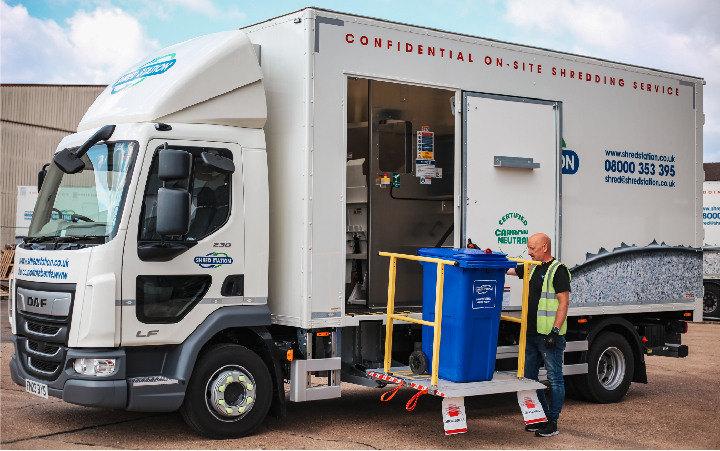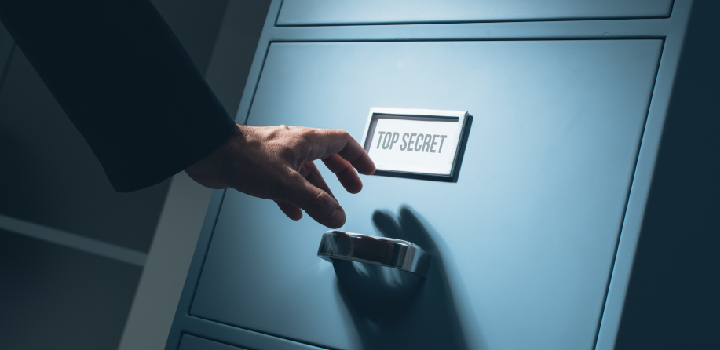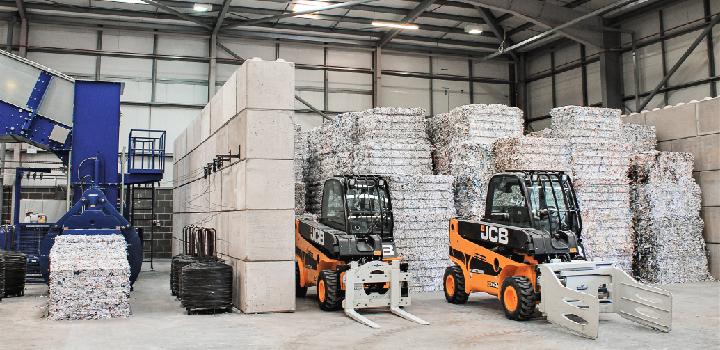How do you dispose of classified or confidential documents?
Many different types of documents contain confidential information. From old bank statements to Top Secret classified government documents, secure destruction is always the best solution to keep this information safe when it’s no longer needed.
There are different tiers of security classification for classified documents. In the UK, the current tiers are Official, Secret, and Top Secret. The National Protective Security Authority (NPSA) gives best practice guidance on what methods should be taken to handle and destroy documents in each of these tiers, as does the UK government website. Generally speaking, they should be destroyed by a company approved to NPSA standards, to a small enough particle size that they could not reasonably be reassembled. Certain documents should also have the destruction witnessed. This is possible with on-site shredding services.
Documents that aren’t classified can also be confidential. With confidential non-classified documents, it’s still important to ensure secure handling and disposal.
Please note that the destruction standards for classified government materials may differ from the standards that most businesses need to follow. We’ve put together a help guide to understand these differences better.
Where should confidential documents be stored?
Before destruction, all confidential documents should be secured. With classified confidential documents, there are a lot of restrictions surrounding storage practices. For instance, many documents cannot be taken out of government premises before destruction, and if they are to be moved, they must be escorted by hand rather than by mail or courier.
Shred Station offers secure, lockable bins and cabinets. The containers are sturdy with many security features that make them suitable for storing materials before destruction. These can be kept in a central location at government/business premises or throughout buildings in specific departments for collection. When we onboard customers such as police forces and government organisations or are visiting high-security facilities, we let the customer decide what would better suit them whilst also causing minimal risk. Shred Station has staff members vetted to NPPV, CTC, and SC clearance standards, so all classified and confidential information is in safe hands.

How should classified confidential documents be discarded?
How classified confidential documents should be discarded depends largely on their classification.
Official Documents
The majority of classified government and public sector documents are labelled Official. They are documents that would cause low or moderate damage if compromised, rather than documents that would, for instance, compromise national security. Examples could include HR records, healthcare information, and electoral registers.
On-site and off-site shredding services are considered appropriately secure for official documents.
Secret Documents
Secret classification is used for documents that contain very sensitive information and require heightened protection against the risk of threat. The main difference between Secret and Top Secret classification is the need to be shared readily and promptly across His Majesty’s Government’s cleared personnel. A time-critical document, for instance, counterterrorism information, may need to be labelled as Secret so as not to hinder the ability to share it. The UK Government website states that “the sensitivity of Secret information and the risks associated with its compromise need to be balanced against the risks of not sharing the information with colleagues who have a genuine need-to-know”. Examples of Secret documents could include travel plans for Royals and top-level government representatives or information about imminent terror threats.
When destroying Secret documents, on-site granulation or high-security shredding services are preferable. These will result in much smaller fragments than a standard on-site service and allow authorised personnel to visually confirm the documents have been destroyed in line with the NPSA guidelines. Standard on-site and off-site shredding services can be used, but this decision must be risk-assessed and made by the end users.
Top Secret Documents
Top Secret classification is reserved for the most sensitive information that requires “extremely high assurance of protection from the most serious threats”. Examples of Top Secret documents could include military defence plans or intelligence on terrorist organisations.
There are many restrictions in place for handling, printing, accessing and destroying Top Secret documents. Top Secret documents should not be destroyed without written approval from the information creator. They must also be destroyed with a DV-cleared witness present. On-site granulation services, where documents are destroyed into tiny 2mm fragments, would be the most secure form of shredding service for Top Secret materials. For this, we would only use SC-cleared staff members to perform the shredding.

How do you deal with confidential company data?
In the private sector, businesses will not need to procure NPSA-approved high-security shredding services or follow such strict procedures when destroying confidential information. A standard off-site or on-site shredding service is secure enough to guarantee that your documents or materials aren’t at risk of reassembly or misuse. However, your business should ensure that any destruction is performed by a fully accredited company that uses security-vetted employees. This will prevent the risk of reputational damage and ensure that your service will be compliant.
At Shred Station, we recommend that businesses should implement a ‘Shred Everything’ policy. This will prevent your employees from making the wrong decision regarding whether information is confidential or not. It will also help you to stay on top of your organisation’s data retention policy.

How much does it cost to shred documents in the UK?
The price of shredding services varies depending on a number of factors. For instance:
- The quantity of materials you have.
Generally, the higher the quantity you have, the lower the charge you’ll receive per bag/box/pallet.
- The type of materials you have.
For example, architectural paper may be priced separately from plain white office paper. Non-paper items like hard drives will also need to be priced and bagged/boxed separately.
- Where you want the services conducted.
These could be on-site at your premises or off-site at a secure facility.
- How often you want the service performed.
For example, you may receive discounted rates per collection if you have regular contracted services.
- If you require a high-security service.
For most materials, a standard shredding service is considered appropriate to ensure the security of confidential information. However, some organisations do require a smaller shred size, for example, a granulation service or a high-security shredding service. Granulation is where documents are destroyed into tiny 2mm fragments. High security is where shredded materials are re-shredded two or more times using specialist machinery or shredded through a smaller screen resulting in a smaller particle size. Shred Station offers both services on and off-site. However, because these services take a lot more time than a standard shredding service, they do come with a higher price tag.
Some shredding services are also just more expensive than others. Independent shredding service suppliers like Shred Station can often offer much cheaper rates than other large shredding companies. This is thanks to factors such as lower overheads. We are often told that our quotes are much more cost-effective than our competitors. For a formal and more accurate quote, please contact our team.
Sign up for our newsletter to receive alerts about new blog articles, data protection advice, and Shred Station news.
